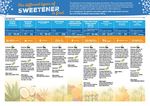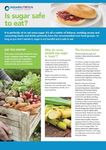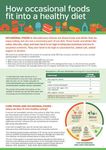Sweet Facts Brush up on your sugars and nutrition knowledge with the facts TOOLKIT
←
→
Page content transcription
If your browser does not render page correctly, please read the page content below
Who we are
The Sugar Nutrition Resource Centre
(SNRC) is an info hub for factual
information on sugars and their role
in nutrition. You can find us at
www.sugarnutritionresource.org
The website is run by a team of
qualified nutrition professionals.
We have input from a group of
expert scientists, to make sure the Our mission
information is evidence based. We We aim to gather the facts on sugars
are funded by Sugar Australia and from the nutrition research. We want
New Zealand Sugar. to provide a local perspective on the
science and share the most relevant
updates for a clearer understanding
of sugars and nutrition.
Our resources
LA T ES T
news and
research
Search our resource
library for fact
sheets, infographics,
brochures and
research briefs.
FR EE
to download
and share
Our articles explore global
weet Bites is our monthly newsletter, edited by a
S sugars and nutrition news,
dietitian and circulating since 2002. Sign up for nutrition research and issues,
news and articles on sugars, carbohydrates and health. providing context for the
local ANZ environment.
K EEP
up to date
P2Sugars and
nutrition in
context
Obesity is complex -
sugars have a role
There can be many causes of obesity.
These include eating more energy
(kilojoules) than your body uses, inactivity,
genetics, conveniences linked to modern
living, and socio-economic factors. For
many, too much energy or kilojoules
consumed from any source, including
sugars, contributes to weight gain.
Eat sugars in moderation
Dietary guidelines in Australia and New
Zealand advise to choose foods and drinks
with little or no added sugars, and to limit
intake. In general, it appears ANZ
populations are listening to this advice
with the latest data showing sugars intake
decreasing over time.
Learn more on our website about sugars
intake and recommendations
P3How much do you know
about sugars and nutrition?
1 The scientific
name for
table sugar is
sucrose. Sucrose is a
2 Sugars are carbohydrates that
provide energy for the body.
1 gram of sugar = 17 kilojoules of energy
1 gram of fat = 37 kilojoules of energy
disaccharide, which
1 gram of protein = 17 kilojoules of energy
means it has two single
sugar units joined We need about 8700 kilojoules per day to
together. stay alive and active.
Sucrose =
glucose + fructose
3 Sugars in food can be
natural (fruit, vegetable
and dairy) or added during
processing, cooking or at
4 Sugars have many
functions in food and
drinks. They provide
sweetness, colour and
the table. texture. They also act as a
Both natural and added preservative (jams), balance out
sugars are digested and used acidic and bitter flavours and are
for energy in the same way. used for fermentation and rising
What’s important is the overall (bread, beer).
healthiness of the food.
Visit our website for more
FAQ’s and sugar facts.
P4Sugars and nutrition
resource library
Check out these items on the website.
Fact Sheet
The different types
of sweeteners in food
• The main nutritive and non-
nutritive sweeteners
• How these sweeteners are
produced
• Sweetness compared to sugar
• The Glycemic Index of each
sweetener
Fact Sheet
Is sugar safe to eat
• Why sugar is sometimes described as toxic
• Fructose and its effect on the body
• Should you follow a sugar-free diet
Booklet
How occasional foods fit into a
healthy diet
• What are occasional foods
• How much occasional foods should we eat
• Examples of common occasional foods
and portion sizes
P5Find out more at sugarnutritionresource.org This information is for general use only. Please consult a qualified health professional for individual medical advice if needed. October 2020
You can also read



























































